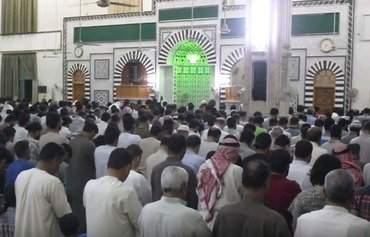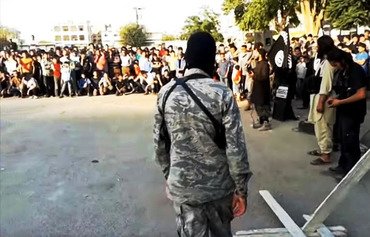As the Syrian Democratic Forces (SDF) close in on "Islamic State of Iraq and the Levant" (ISIL) strongholds in northern Syria, backed by coalition forces, the group is desperately seeking to prevent residents from accessing the news.
Less than a week before Ramadan, ISIL distributed leaflets to al-Raqa residents informing them that they must destroy their satellite dishes before the start of the holy month, the Syrian Observatory for Human Rights said.
Eye witnesses in al-Raqa who spoke with Al-Shorfa said the group has begun conducting patrols in the city to ensure residents are in compliance.
On June 2nd, the Observatory said it had obtained a copy of the order distributed to al-Raqa residents by ISIL's al-hesba ("religious police") pertaining to the removal of satellite dishes from homes.
The order stated that all satellite dishes are banned in "Islamic state" territory and must be removed from the homes of Muslims and non-Muslims alike, and called on all residents to hand over their satellite dishes.
ISIL seeks to hide its losses
ISIL's new campaign to ban satellite dishes in al-Raqa has nothing to do with piety, said al-Raqa entrepreneur Ali Saeed, who asked to use a pseudonym out of concern for his safety.
"It is obvious that the group wants to keep the people of al-Raqa uninformed of the latest security developments, particularly the offensive carried out by the SDF in alliance with international coalition forces," he told Al-Shorfa.
The group wants to stop news of its successive defeats from circulating, since that could lead to the outbreak of a rebellion in and around the city, he added.
ISIL had previously banned Internet access, Saeed said, which turned the city into an "isolated island where the only news received of the outside world are the lies disseminated by the group via its paper publications and CDs distributed at its ubiquitous media kiosks".
This is not the first time either that ISIL asks residents to dispose of their satellite dishes.
Last Ramadan, the group issued an order via fliers and mosque preachers imposing a ban on satellite dishes, said al-Raqa salesman Abdulkadir Yahya, who asked to use a pseudonym out of fear for his safety.
Complete media blackout
Cafés were banned from turning on televisions and forced to play CDs distributed to them by the group containing Qur'an recitations, anasheed (religious songs) and news prepared by the group in Ramadan 2015, Yahya said.
ISIL asked residents via mosque preachers to not watch satellite channels "on the grounds that they broadcast pornographic movies", he said.
Last year, al-hesba elements roamed the city, asking residents to remove satellite dishes installed on the roofs of houses, he said.
However, the ban was not seriously enforced at the time and there was no mention of it after Ramadan, he said.
This year, however, the ban is being strictly enforced, he added, with ISIL calling for residents to destroy their own devices in public as the group looks on.
"ISIL elements have been filming residents doing this, and asking them to chant religious phrases and smile to appear as though they support the ban," he said, adding that everyone has been complying with the order.
Some neighbourhoods were even asked to gather and engage in "mass destruction" of the devices, Yahya said.
ISIL has been recording the names of those who comply, rigorously inspecting neighbourhoods house by house, and climbing to the top of the highest buildings to ascertain that rooftops are clear of satellite dishes, he said.
'Islam calls for openness'
ISIL's flier is a prime example of "the reactionary backwards thinking that takes the area’s residents back hundreds of years", said Sheikh Moaz Abdul Karim, a former preacher at al-Omar mosque in Aleppo city who now resides in Cairo.
The flier, titled "Why I should destroy the satellite dish", includes 20 bullet points explaining ISIL's rationale, he told Al-Shorfa, most notably that satellite channels "broadcast infidel ideas and promote other religions and sects".
The channels also portray the lifestyle of "infidels" to solicit admiration for them, according to the flier, which also admonishes television channels for broadcasting series, claiming that Islam has forbidden acting, Abdul Karim said.
"All of these reasons have nothing at all to do with Islam," he said. "On the contrary, the religion calls for openness to the world and keeping up with all that is new in culture and science."
With a few exceptions, he said, television programmes are good and enjoyable entertainment for the family, noting that acting is not forbidden by religion.

![A sign announces the presence of an 'Islamic State of Iraq and the Levant' media centre, which distributes the group’s publications, leaflets and CDs to al-Raqa residents. [Photo courtesy of al-Raqa is Being Slaughtered Silently]](/cnmi_am/images/2016/06/14/5552-Syria-raqa-media-600_384.jpg)






